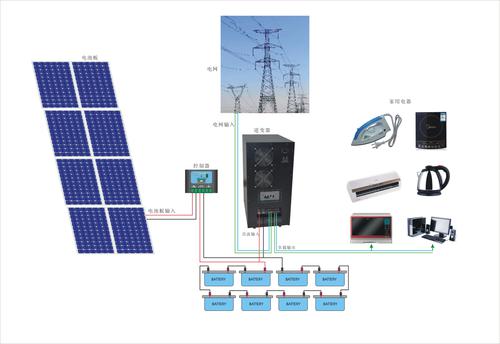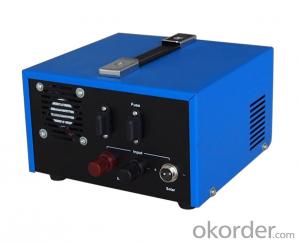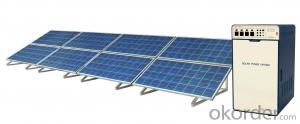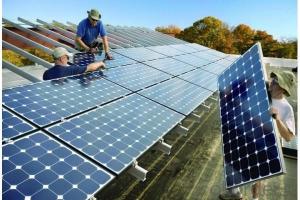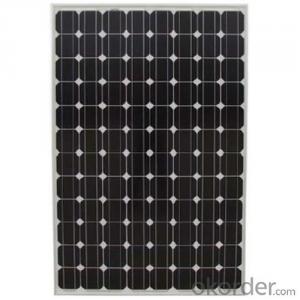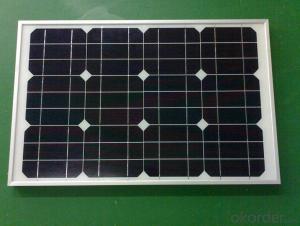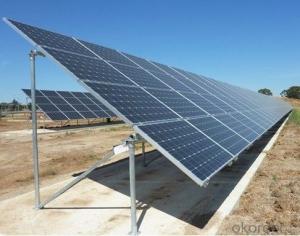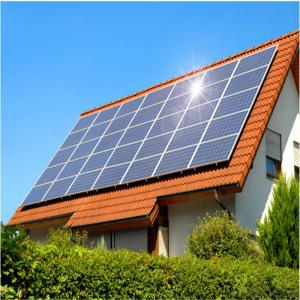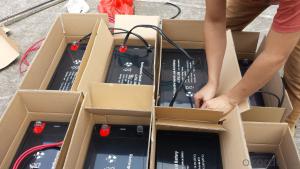Complete 24V 1000W solar panel systems
- Loading Port:
- Guangzhou
- Payment Terms:
- TT OR LC
- Min Order Qty:
- -
- Supply Capability:
- 1000sets set/month
OKorder Service Pledge
OKorder Financial Service
You Might Also Like
Hot sale solar panel system for home use 1000W
Features
Solar cell modules
It converts solar energy into electrical energy and the frames support solar panels.
Charge controller
It supplies direct current regulated from solar modules to the battery or inverter.
Stand-Alone Inverter
It supplies alternative current to loads after rectifying the direct current.
Battery
It supplies the electric power to loads through inverter in case the electric power generated from solar modules is in short supply or at night.
Complete 24V/1000W stand alone solar systems
5×200w poly solar panels//1×24V/50A solar charge controller//1×48V/3000W pure sine wave
inverter//4×12V/200Ah lead acid batteries//ground mounting brackets//50m PV cables for solar
panels connection//dual connectors for solar panels connection//connection cables for batteries.
average produce 6kwh power each day!!!
| 12V/200W Poly-crystalline Solar Panels | ||||||||
| Model: 200P Maximum power:200W Maximum power voltage:35V Maximum power current:5.71A Open circuit voltage:42.48V Short circuit current:6.29A Dimension:1350mm×1000mm×45mm Weight: 17.5kg Solar cells:48pieces(6×8)poly solar cells156mm×156mm;Grade A; CE certification Maximum systems voltage: 1000V | 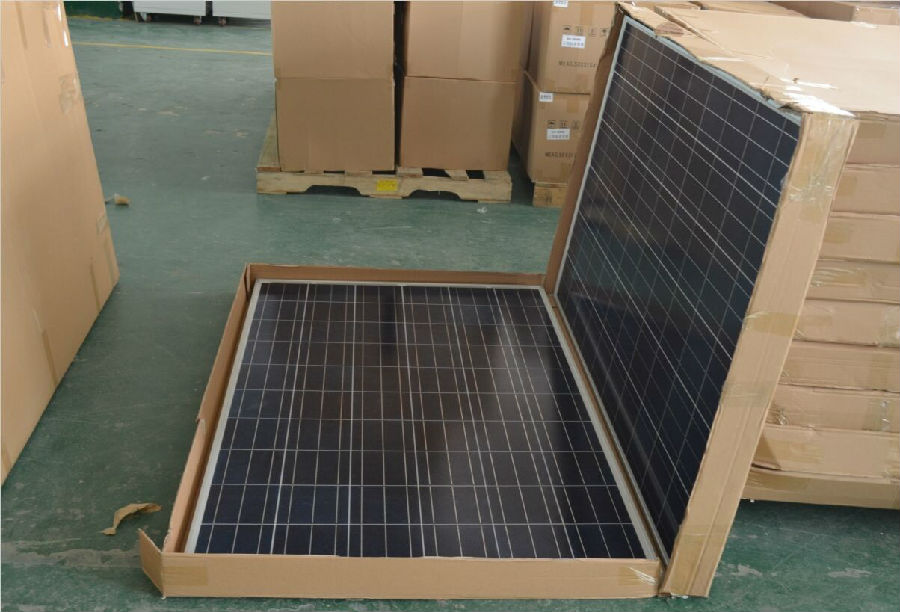 | |||||||
Wiring of solar panels: 1 panels in series, 5 strings in parallel | ||||||||
| 24V/50A solar charge controller | ||||||||
| Model:KF2450 Rated voltage: 24V Rated current: 50A Over-voltage protection 34V Over-discharge recover voltage: 25V working temperature: -20℃~45℃ Dimension: 184mm×110mm×57mm Weight: 0.66kg Features: battery switch | 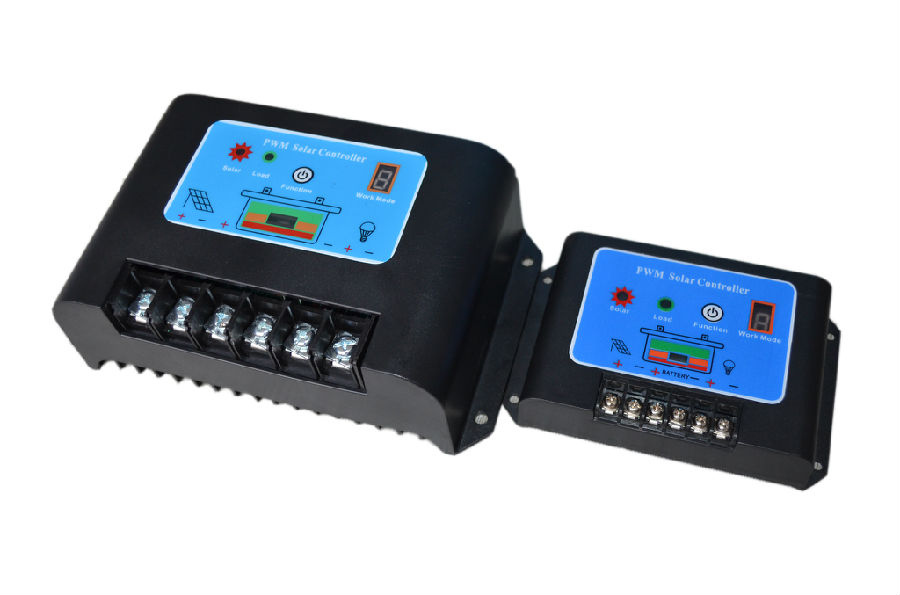 | |||||||
| Wiring of solar charge controller: firstly connect solar charge controller with battery bank, then connect solar charge controller with solar panels array, at last connect solar charge controller with loads or pure sine wave inverter | ||||||||
| 48V/3000W Pure Sine Wave Inverter | ||||||||
| Model:XD-NB10224 Rated input voltage:DC24V Input voltage range:75V~125V OR 145V~275V Output voltage:AC210V~AC240V Rated output power:1000W Maximum output power:2000W Output wave form: pure sine wave Dimension:396mm×190mm×240mm Weight:14kg. Working temperature: 0℃~40℃. Battery low voltage shutdown: DC21V | 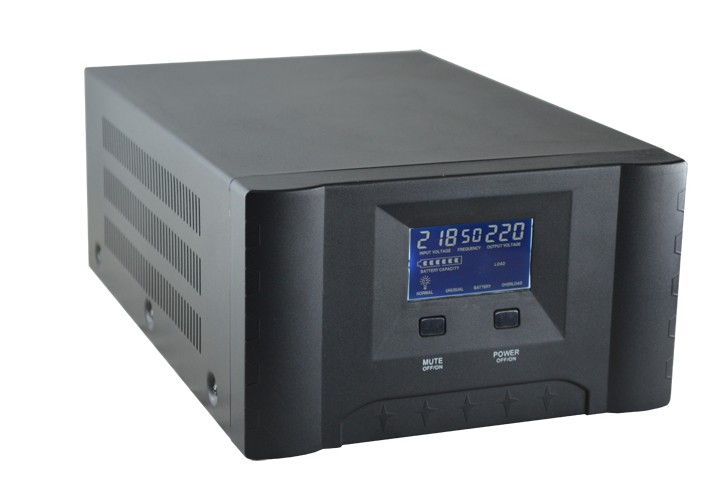 | |||||||
| 12V/200Ah deep cycle battery | ||||||||
| Deep cycle batteries in our stand alone solar systems have 2000 time charging-discharging cycle at 50% DOD. Gel batteries have better performance than lead acid batteries under cold temperature. besides, these battery are free-maintenance. |
| Package&shipment terms | |||||||||
| 1,We would pack all components into one plywood case and put much foam inside of plywood case, this packing way can make all components stand long distance transportation. 2,Because batteries are a kind of very heavy components and can't be allowed to transport by air, we have to choose sea transportation. though sea transportation would take more days to arrive, however you can save much postage. 3.We would ship the system to any bigger port near to customers, customers need to go to the port and pick up the system. |
More pictures about the solar panel system:
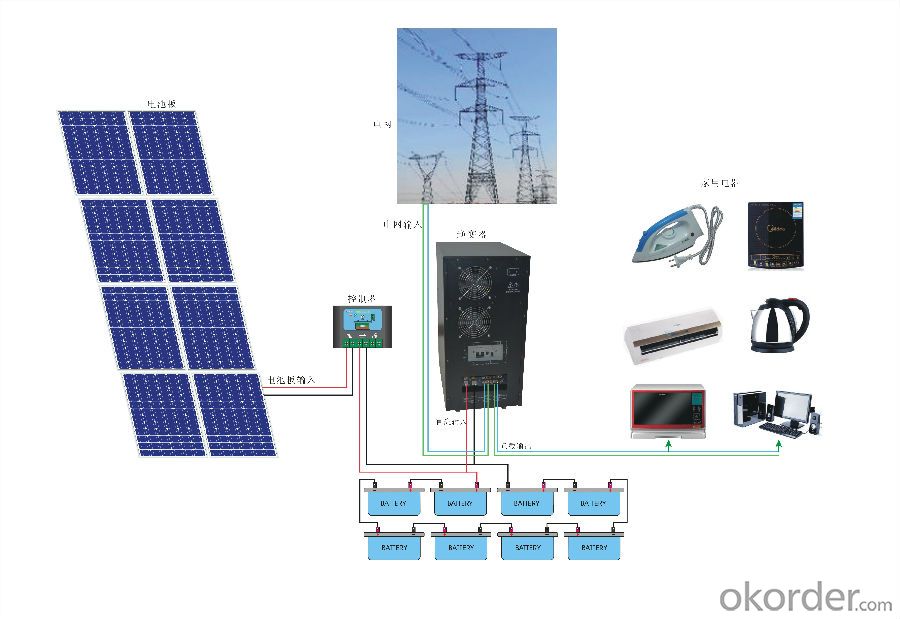
- Q: Can solar energy systems be used in powering street cameras or surveillance systems?
- Yes, solar energy systems can indeed be used to power street cameras or surveillance systems. Solar panels can be installed on rooftops or poles near the surveillance systems, capturing sunlight and converting it into electricity. This renewable energy source can provide a reliable and sustainable power supply, ensuring continuous operation of the cameras and surveillance systems even in remote areas without access to the electrical grid. Additionally, solar energy systems eliminate the need for costly and environmentally harmful fossil fuels, making them an environmentally friendly choice for powering street cameras and surveillance systems.
- Q: Can solar energy systems be used in powering mining operations?
- Solar energy systems have the ability to power mining operations. This clean and sustainable source of power can generate electricity, benefiting mining operations in various ways. To begin with, mining buildings or nearby land can be equipped with solar panels to capture sunlight and convert it into usable electricity. This electricity can then be utilized to power different aspects of the mining site, such as lighting, ventilation systems, and machinery. By embracing solar energy, mining companies can decrease their reliance on fossil fuels and reduce their carbon footprint. Furthermore, solar energy systems can be combined with energy storage solutions, like batteries, to ensure a continuous power supply even when the sun is not shining. This guarantees that mining operations have a dependable source of electricity throughout the day and night, eliminating the need for backup generators or reliance solely on the grid. In addition, solar energy systems can be particularly advantageous for remote mining sites that are far from the electrical grid. In such cases, installing solar panels and battery storage systems can provide a cost-effective and sustainable solution for powering mining operations, avoiding the need for lengthy transmission lines or expensive diesel generators. In conclusion, solar energy systems have the potential to effectively power mining operations. They offer a renewable and sustainable source of electricity, reduce dependence on fossil fuels, and can be combined with energy storage for uninterrupted power supply. By embracing solar energy, mining companies can not only reduce their environmental impact but also enhance their long-term sustainability and operational efficiency.
- Q: Are there any health risks associated with solar energy systems?
- There are minimal health risks associated with solar energy systems. The main concern is the potential for electrical shock or fire hazards during installation or maintenance. Additionally, the production of solar panels involves the use of potentially harmful chemicals, although strict regulations are in place to minimize exposure. Overall, when properly installed and maintained, solar energy systems are safe and pose no significant health risks.
- Q: What is the role of solar-powered water purification systems in providing clean drinking water?
- Solar-powered water purification systems play a crucial role in providing clean drinking water by harnessing the energy from the sun to remove impurities and pathogens from water sources. These systems use solar panels to generate electricity, which powers various purification technologies such as filtration, disinfection, and reverse osmosis. By relying on renewable energy, solar-powered water purification systems can operate in remote areas without access to electricity, making them a sustainable and cost-effective solution. Moreover, these systems reduce dependence on traditional fuel sources and contribute to mitigating environmental pollution. Overall, solar-powered water purification systems are instrumental in ensuring access to safe and clean drinking water, particularly in regions facing water scarcity or contamination issues.
- Q: What is the role of batteries in a solar energy system?
- Batteries play a crucial role in a solar energy system by storing excess electricity generated by the solar panels. This stored energy can be used during periods of low or no sunlight, ensuring a continuous and reliable power supply. Additionally, batteries help to balance the supply and demand of electricity, providing stability to the solar energy system and enabling it to operate efficiently.
- Q: Are there any regulations or permits required for installing solar energy systems?
- Yes, there are regulations and permits required for installing solar energy systems. The specific requirements vary by location, but typically involve obtaining permits for building and electrical work, adhering to zoning and building codes, and complying with utility interconnection regulations. It is important to consult with local authorities or a professional installer to ensure compliance with all necessary regulations and obtain the required permits before installing a solar energy system.
- Q: Can solar energy systems be used in conjunction with battery storage?
- Yes, solar energy systems can be used in conjunction with battery storage. Battery storage allows excess solar energy to be stored for use during periods of low sunlight or at night, thereby increasing the overall efficiency and reliability of the solar energy system.
- Q: Can solar energy systems be used for powering air conditioning systems?
- Yes, solar energy systems can be used for powering air conditioning systems. Solar-powered air conditioning systems, also known as solar air conditioners, utilize the sun's energy to power the cooling process. These systems typically consist of solar panels that capture sunlight and convert it into electricity, which is then used to run the air conditioning unit. By using solar energy, these systems offer a sustainable and environmentally-friendly alternative to conventional air conditioning systems that rely on fossil fuels. Solar air conditioners are particularly beneficial in areas with abundant sunlight, as they can significantly reduce energy costs and dependency on the electrical grid.
- Q: How do solar energy systems impact the efficiency of air conditioning systems?
- Solar energy systems can significantly impact the efficiency of air conditioning systems by providing a clean and renewable source of power. By harnessing solar energy, air conditioning units can operate without relying solely on grid electricity, reducing their carbon footprint and energy costs. Additionally, solar-powered air conditioning systems can operate during peak demand periods when electricity rates are typically higher, further enhancing their efficiency.
- Q: Can solar energy systems be used for powering electric vehicle component manufacturing plants?
- Yes, solar energy systems can be used to power electric vehicle component manufacturing plants. Solar panels can generate electricity that can be used directly or stored in batteries for later use. By utilizing solar energy, these plants can reduce their reliance on fossil fuels, lower their carbon footprint, and contribute to a more sustainable manufacturing process for electric vehicles.
Send your message to us
Complete 24V 1000W solar panel systems
- Loading Port:
- Guangzhou
- Payment Terms:
- TT OR LC
- Min Order Qty:
- -
- Supply Capability:
- 1000sets set/month
OKorder Service Pledge
OKorder Financial Service
Similar products
Hot products
Hot Searches
Related keywords

